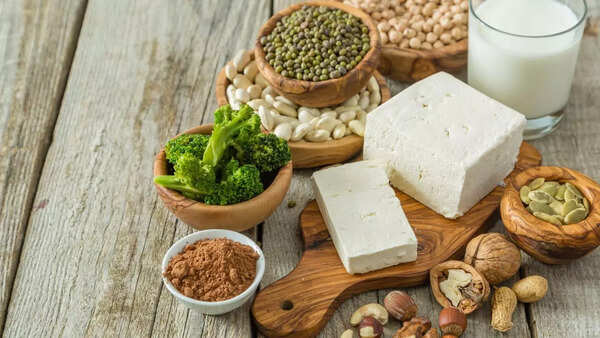Proteins are essential for tissue building, repair, and the maintenance of cellular functions. While protein-rich diets and supplements are popular, most individuals already obtain sufficient protein through their regular dietary intake. Focusing on balanced nutrition and consistent exercise is a more effective approach to overall health than relying solely on supplements for additional protein.

Proteins are fundamental to all living cells, supporting vital structural and functional roles. Composed of amino acids, they facilitate essential bodily processes. While the body synthesizes some amino acids, essential amino acids must be acquired through diet. As a key macronutrient, alongside carbohydrates and fats, protein is critical for:
While a relatively high protein intake is generally considered safe, excessive consumption may be unnecessary and potentially detrimental. Protein deficiency is rare, primarily affecting malnourished individuals or those with limited food access in low-income regions.
The World Health Organization (WHO) recommends approximately 0.8 grams of protein per kilogram of body weight daily for healthy adults.
However, individual protein needs vary; athletes and physically active individuals often require more.
Animal-based protein sources are complete proteins, supplying all essential amino acids, and often include additional nutrients like iron and zinc.

Examples include:
Plant-based sources may not always provide all essential amino acids in a single food. However, consuming a variety of plant proteins throughout the day can fulfill protein requirements.

Examples include:
Vegans and vegetarians may have slightly lower protein intakes than non-vegetarians. However, adequate protein requirements can be met through strategic food choices. The key is incorporating a variety of plant-based protein sources.

These include:
Vegetarians can also obtain protein from dairy products.
Be aware of the following symptoms that may indicate overconsumption of protein:
Consult a registered dietitian or healthcare professional for personalized protein intake recommendations.
Newer articles
Older articles
 India Enters New Space Age as Astronaut Shukla Joins ISS Mission
India Enters New Space Age as Astronaut Shukla Joins ISS Mission
 X Cracks Down: Half a Million Indian Accounts Suspended for Policy Breaches
X Cracks Down: Half a Million Indian Accounts Suspended for Policy Breaches
 Google Unveils Strategy to Combat Misinformation, Boost Voter Access in India's 2024 Elections
Google Unveils Strategy to Combat Misinformation, Boost Voter Access in India's 2024 Elections
 Hair Oil vs. Hair Serum: Which is the Right Choice for Your Hair?
Alternatively:
Unlock Your Best Hair: Choosing Between Hair Oil and Serum for a Healthy Mane
Hair Oil vs. Hair Serum: Which is the Right Choice for Your Hair?
Alternatively:
Unlock Your Best Hair: Choosing Between Hair Oil and Serum for a Healthy Mane
 Bollywood's 'Swades' Anthem Joins Axiom-4 Mission: Indian Astronaut's Playlist Honors Heritage in Space
Bollywood's 'Swades' Anthem Joins Axiom-4 Mission: Indian Astronaut's Playlist Honors Heritage in Space
 Vijay Sethupathi Apologizes Amid Controversy Over Son's Film 'Phoenix'
Vijay Sethupathi Apologizes Amid Controversy Over Son's Film 'Phoenix'
 New York Assemblyman Zohran Mamdani's Style: 5 Lessons in Authenticity and Heritage
New York Assemblyman Zohran Mamdani's Style: 5 Lessons in Authenticity and Heritage
 Colon Cancer: Don't Ignore These 5 Early Warning Signs
Colon Cancer: Don't Ignore These 5 Early Warning Signs
 TSMC Regains Top 10 Global Value Ranking Amid AI Boom
TSMC Regains Top 10 Global Value Ranking Amid AI Boom
 Android Users Urged to Update Devices Amid High-Severity Security Flaws: Government Issues Warning
Android Users Urged to Update Devices Amid High-Severity Security Flaws: Government Issues Warning